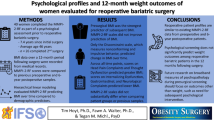Abstract
Background
To compare psychological characteristics of patients seeking laparoscopic adjustable gastric band (LAGB) and gastric bypass surgery.
Methods
In the present study, 898 women were assessed as part of a comprehensive presurgical evaluation. Of these 898 patients, 107 (12%) were seeking LAGB surgery and 791 (88%) were seeking gastric bypass surgery. Their scores on a battery of psychological tests were compared with T-tests with Bonferroni correction.
Results
Those patients seeking gastric bypass had greater body mass indices than those seeking LAGB. However, the analyses found no statistically significant differences on measures of IQ, depression, anxiety, anger, self-assessed reasons for weight gain, and psychopathology and personality as indicated by Minnesota Multiphasic Personality Inventory-2 scale scores.
Conclusions
The psychological evaluation can be helpful in identifying behavioral and emotional issues that merit adjunct psychological attention to optimize long-term surgical outcome. These results suggest that, as a group, no differential treatment planning needs to take place for psychological issues based on surgery performed.
Similar content being viewed by others
References
Wadden T, Brownell K, Foster G. Obesity: responding to the global epidemic. J Consult Clin Psychol 2002;70:510–25.
Maggard M, Shugarman L, Suttorp M, et al. Meta-analysis: surgical treatment of obesity. Ann Intern Med 2005;142:547–59. (W-94-W-118).
Favretti F, Segato G, Ashton D, et al. Laparoscopic adjustable gastric banding in 1,791 consecutive obese patients: 12-years results. Obes Surg 2007;17:168–75.
Stout A, Applegate K, Friedman K, et al. Psychological correlates of obese patients seeking surgical or residential behavioral weight loss. Surg Obes Relat Dis 2007;3:369–75.
Shipley W. Shipley Institute of Living Scale—revised manual. Los Angeles, CA: Western Psychological Services; 2000.
Beck AT, Steer RA, Brown GK. The Beck Depression Inventory—second edition manual. San Antonio, TX: The Psychological Corporation; 1996.
Spielberger CD. State-Trait Anxiety Inventory for adults. Redwood City, CA: Mind Garden; 1983.
Spielberger CD. State-Trait Anger Expression Inventory-2. Odessa, FL: Psychological Assessment Resources; 1999.
Butcher JN, Dahlstrom WG, Graham JR, et al. Minnesota Multiphasic Personality Inventory-2: manual for administration and scoring. Minneapolis: University of Minnesota Press; 1989.
Wadden T, Foster G. Weight and Lifestyle Inventory (WALI). Philadelphia, PA: University of Pennsylvania, 2001. Reprinted in: Wadden TA, Stunkard AJ, ed. Handbook of Obesity Treatment. New York, NY: Guilford, pp 209–226.
Fabricatore A, Wadden T, Sarwer D, et al. Self-reported eating behaviors of extremely obese persons seeking bariatric surgery: a factor analytic approach. Obes Surg 2006;14:83S–9S.
Fabricatore AN, Crerand CE, Wadden TA, et al. How do mental health professionals evaluate candidates for bariatric surgery? Obes Surg 2006;16:567–73.
Bauchowitz AU, Gonderer-Frederick LA, Olsbrich ME, et al. Psychosocial evaluation of bariatric surgery candidates: a survey of present practices. Psychosom Med 2005;67:825–32.
Ritz SJ. The bariatric psychological evaluation: a heuristic for determining the suitability of the morbidly obese patient for weight loss surgery. Bariatric Nurs and Surg Pat Care 2006;1:97–105.
Author information
Authors and Affiliations
Corresponding author
Additional information
This is an original submission and the author has no conflict of interest associated with the paper.
Rights and permissions
About this article
Cite this article
Walfish, S. Psychological Correlates of Laparoscopic Adjustable Gastric Band and Gastric Bypass Patients. OBES SURG 20, 423–425 (2010). https://doi.org/10.1007/s11695-008-9666-9
Received:
Accepted:
Published:
Issue Date:
DOI: https://doi.org/10.1007/s11695-008-9666-9




